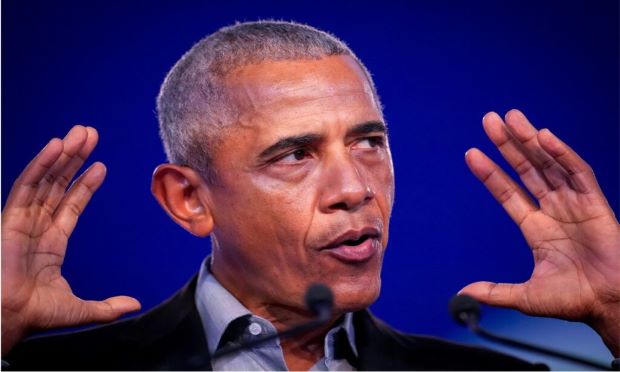We are nowhere near where we need to be
Obama, in climate speech focused on youth, has words for Republicans, too
By Somini Sengupta
GLASGOW — Former President Barack Obama, who helped to seal the Paris climate agreement six years ago, returned to an international climate summit here to rally nations to heal the planet, acknowledging the enormous complexity of the crisis but arguing that humanity has the capacity to create a safer, healthier world.
“To be honest with ourselves, yes, this is going to be really hard,” said Obama, who was welcomed with sustained applause by delegates from nearly 200 nations. “The thing we have going for us, is that humanity has done hard things before. I believe we can do hard things again.
Obama noted that the Paris Agreement, signed by 197 countries in 2015, created a framework for climate action, but nations, including the United States, failed to follow through on their commitments to keep global warming within relatively safe margins.
“Important work was done there and important work is being done here,” he said. “That is the good news. Now for the bad news. We are nowhere near where we need to be.”
Obama’s appearance at the summit was greeted with enormous enthusiasm, with a large crowd straining to catch a glimpse of the former president, phones held aloft to snap a photo as he walked into the hall. He received a standing ovation after his address.
At each of several events, Obama emphasized the power of activism, particularly from young people, in pushing countries and companies to address the climate crisis.
“The most important energy in this movement is coming from young people,” he said. “And the reason is simple. They have more at stake in this than anybody else.”
He said he understood the psychic weight carried by younger generations, and the anger that many feel about inheriting a world where storms have become more ferocious and frequent, and heat waves more deadly; where species are disappearing; and where the future feels frightening.
“I’m the father of two daughters in their early 20s,” he said. “It’s not always easy being young today. For most of your lives, if you’re in that generation, you’ve been bombarded about what the future will look like if we don’t do anything about climate change. And you’ve grown up watching the adults either act like the problem doesn’t exist or don’t do anything about it. It’s a real source of anxiety, and some of you no doubt wonder if you’ll be safe.”
And he acknowledged that he, too, sometimes felt overwhelmed.
“There are times where I feel discouraged, there are times when the future seems somewhat bleak, there are times when I am doubtful that humanity can get its act together before it’s too late,” he said. “Images of dystopia creep into my dreams.”
But, he cautioned, “cynicism is the recourse of cowards. We can’t afford hopelessness.”
For Obama, Glasgow also amounted to a kind of redemption tour. After witnessing his legacy on climate policy ruthlessly undone by his successor, Donald Trump, Obama was able to represent a United States that was once again at the table, to tackle a global problem that it has had such a big hand in making.
Trump pulled the United States out of the Paris accord, which Obama had played a significant role in brokering, and unwound more than 100 of Obama’s environmental regulations. On Monday, he called Trump’s tenure “four years of active hostility toward climate science, coming from very top of our government.”
To the extent President Joe Biden has been able to restore Obama’s climate agenda, it has been through diplomatic moves, such as re-joining the Paris Agreement, or through legislation that, if it wins passage, will do so almost entirely on Democratic votes because Republicans have withheld any support.
“One of our two major parties has decided not only to sit on the sidelines, but express active hostility toward climate science and make climate change a partisan issue,” Obama said.
At the roundtable event in the late afternoon, a large group of students waited at the entrance to see his arrival at the University of Strathclyde. An even larger group gathered near the gates when he left, nearly two hours later.
Luisa Neubauer, 25, a leader of the Fridays for the Future movement in Germany, who was part of the roundtable, said afterward that it was a positive sign that the United States, under Biden, was making new pledges, although she felt it hadn’t been honest about its past failings. “Young people, me included, we are very reluctant to be hopeful just because a new leader makes a promise or a former president goes around making promises,” she said. “Because we have been betrayed again and again.”
Obama urged the delegates to keep pushing forward, turning to Shakespeare for inspiration about the pace of progress. “What wound, he writes, did ever heal but by degrees?” Obama said in his plenary address.
“Our planet has been wounded by our actions,” he said. “Those wounds won’t be healed today or tomorrow or the next. But they can be healed by degrees. If we start with that spirit, if each of us can fight through the occasional frustration and the dread, if we do our part and follow through our commitment, I believe we can secure our future. We have to. And what a profound and noble task we have set for ourselves.”
-New York Times


